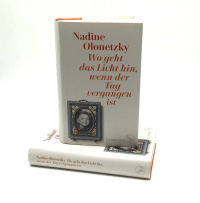An untold story about Germany that concerns us all
Only once did her father tell her what had happened to him and his family during the Shoah. It was on a park bench in Zurich’s botanical gardens.
Nadine Olonetzky was born into a middle-class family with an appreciation of art in Switzerland, which was spared from World War II. She still wears the jewellery of her ancestors on her mother's side, lies on the sofa she inherited from them and thus knows where she comes from. But what remains of her father's family? Where is that sofa today, where is the jewellery?
Her father only tells her once about what happened to him and his family during the Shoah - on a park bench in Zurich, when she was 15. He was only able to save a small photograph from Stuttgart. But he says nothing about the fact that he fought for compensation for more than twenty years. When she comes across a mountain of files, a new picture emerges and she gets to know her father anew. And Nadine Olonetzky begins to write.
This book probes the shadows of his persecution. It is a story of flight, pain, anger and madness, but it is also filled with love and a will to live, the importance of art, the magic of pictures, the soothing energy of a garden – and the limits of a reckoning with the past.
"Nadine Olonetzky tells the story of her family in a very personal, even intimate way." - SRF, Tim Felchlin
"A polyphonic contemporary history and a poignant reflection on concealment and remembrance" - NZZ Geschichte, Martina Läubli
"an interesting, important read" - Deutschlandfunk Büchermarkt, Gisa Funck
"Her research has resulted in an impressive, very personal book" - Frankfurter Rundschau, Petra Pluwatsch








